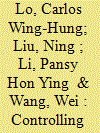|
|
|
Sort Order |
|
|
|
Items / Page
|
|
|
|
|
|
|
| Srl | Item |
| 1 |
ID:
146892


|
|
|
|
|
| Summary/Abstract |
This article traces the institutional development of environmental regulation in urban China, using data from three rounds of surveys of enforcement officials in the Guangzhou Environmental Protection Bureau in 2000, 2006 and 2013. We found that the changes to institutional contexts of regulatory control appear mainly in the fluctuating degree of support from various non-state actors, but not from government entities and regulated industries. While we detected visible organizational changes in local environmental enforcement bureaus, there was also organizational stability. First, the quality of enforcement officials has improved, as reflected by a higher level of education, first from 2000–2006 and then from 2006–2013. Second, the perceived value of enforcement officials in environmental protection was considerably enhanced in the period 2000–2006, and then remained stable from 2006 to 2013. Third, enforcement obstacles in terms of administrative ambiguity remained virtually unchanged from 2000 to 2013, while enforcement power deficit, resource scarcity and procedural ambiguity became more severe. Overall, the general perception of enforcement effectiveness at both the unit and organizational levels has remained the same over the past 13 years, whereas individual-level enforcement was perceived to have become more effective (with significant changes mainly taking place from 2006 to 2013). On the basis of these empirical results, we found that the institutional conditions for stricter enforcement in Guangzhou were visibly improved from 2000 to 2006, but only modestly improved between 2006 and 2013.
|
|
|
|
|
|
|
|
|
|
|
|
|
|
|
|
| 2 |
ID:
178236


|
|
|
|
|
| Summary/Abstract |
This article uses data gathered from a survey that probed the career orientations and values of more than 1,000 law students in Beijing, Hong Kong and Taipei to examine the legal professionalism of future lawyers being trained under different legal education systems in Greater China. Our findings suggest that these future lawyers have a “materialistic” career orientation, although those studying in a system whose legal education goal is to train professional lawyers are more inclined to pursue professional legal ideals, and those trained in a system that emphasizes legal ethics are more likely to pursue public interest issues. On the basis of the findings, we argue that legal education systems in Greater China, while different in their traditions, share the same need to strengthen legal professionalism by according greater emphasis to legal ethics in their respective law school curricula.
|
|
|
|
|
|
|
|
|
|
|
|
|
|
|
|
| 3 |
ID:
192206


|
|
|
|
|
| Summary/Abstract |
To mitigate the COVID-19 pandemic many countries have adopted mandatory social distancing measures, but in China, social distancing was implemented only as an advisory guideline. This article seeks to understand whether, and why Chinese citizens adhered to such social distancing advice. The data, derived from a survey in the 2020 local outbreak in Beijing, show that voluntary compliance was hardly influenced by motivational predictors, but was almost exclusively dependent on a single, key situational predictor, namely people's practical capacity to follow social distancing. These findings demonstrate that the emphasis on intrinsic and extrinsic motivations in existing compliance research does not do justice to the situational nature of voluntary compliance observed within this particular context. We discuss theoretical implications of these findings for the compliance literature. Moreover, we use these findings to provide (tentative) insight into the compliance challenges that China was facing during the course of the pandemic, and to speculate about ways in which compliance may be enhanced during future pandemic outbreaks in China.
|
|
|
|
|
|
|
|
|
|
|
|
|
|
|
|
|
|
|
|
|